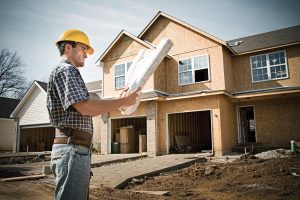Construction Mortgages
Construction Mortgages A construction mortgage advances you the full amount of the mortgage, in stages, throughout the construction (or major renovations) of your home. You can also get a construction mortgage that acts as a conventional mortgage with additional funds for minor improvements. Rates and Terms The type of mortgage you get, as well as […]
Construction Mortgages
A construction mortgage advances you the full amount of the mortgage, in stages, throughout the construction (or major renovations) of your home. You can also get a construction mortgage that acts as a conventional mortgage with additional funds for minor improvements.
Rates and Terms
The type of mortgage you get, as well as your rate and term, will depend on many things. The type of property you’re building, the amount of construction required, how long construction will take – we’ll consider all of that. Come talk to us and we can help figure out exactly what you need.
New build and self-build
If you are building a new home from the ground up, or doing major renovations (either through a professional builder or by yourself), a construction mortgage is your best option.

How does it work?
- The mortgage is split into advances that you get in stages throughout the construction or renovation of your home.
- You can use the first advance to help with the purchase of the land you’re building on.
- Inspectors visit the property before you get each advance to make sure that construction is going according to plan.
- Monthly payments are interest-only until the end of construction.
- After construction, your payments will be a blend of principal and interest.
Choose if:
- A professional builder is doing the work on your new or renovated home.
- You can make interest-only payments and still handle any living expenses you have during construction.
- You can provide us with the required cost estimates, building contract, permits, and quotes.
- Self-build: If you are building or renovating the home yourself, you must be able to prove that you have the experience and skills needed to complete construction.
Purchase plus improvement mortgage
If you need a mortgage to buy a home, plus additional funds for minor home improvements, a purchase plus improvement mortgage is your best option.

How does it work?
- Improvements can’t cost more than 20% of the purchase price, up to a maximum of $40,000.
- You don’t get the money for improvement up front, you are reimbursed for them once they’re complete.
- The required down payment depends on the property’s overall value. We look at the value of the property after it’s improved and the original value of the property plus the cost of improvements. The required down payment is based on whichever value is less.
- So let’s say you paid $700,000 for your home. The improvements cost you $8,000, and your property’s overall value ends up as $710,000. Your down payment is based on the smaller value: $708,000.
Choose if:
- You’re making minor improvements. If you’re making changes to the structure of your new home you should get a construction mortgage.
- You can provide details of the proposed renovations, including cost estimates and contracts.
- You plan to live in this home – you can’t use this mortgage to pay for a rental or investment property.
- You can pay for the improvements up front – you won’t be reimbursed until they’re complete.
There are generally two ways to get a mortgage in Canada: From a bank or from a licensed mortgage professional.
While a bank only offers the products from their particular institution, licensed mortgage professionals send millions of dollars in mortgage business each year to Canada's largest banks, credit unions, trust companies, and financial institutions; offering their clients more choice, and access to hundreds of mortgage products! As a result, clients benefit from the trust, confidence, and security of knowing they are getting the best mortgage for their needs.
Whether you're purchasing a home for the first time, taking out equity from your home for investment or pleasure, or your current mortgage is simply up for renewal, it's important that you are making an educated buying decision with professional unbiased advice.
Free Mortgage Review
Find out how much your home is worth.
Thanks for contacting us! We will get in touch with you shortly.
Videos
DLC - Self Employed Mortgage Solution
DLC Mortgage Life Insurance Explained
DLC- Understanding Your Credit Report
DLC - Fixed VS Variable Rates
Request a Call Back
Let us call you back when it's convenient for you!
Thanks for contacting us! We will get in touch with you shortly.
Keep up to date with the latest mortgage news
Sign up to our newsletter
Thanks for contacting us! We will get in touch with you shortly.
